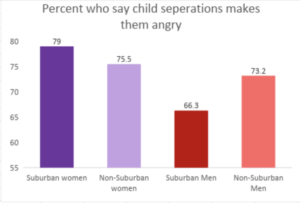This weekend, Donald Trump issued renewed threats to shut down the government to get his border wall and railed against immigration laws. But, that’s not the immigration issue that’s captured the nation’s attention. Instead, voters across the country are tuning into Trump’s policy of separating children from their parents.
This policy plays out as new polls show that support for the GOP is in decline in critical House battleground districts.
There are numerous reasons for the drop off. But increasingly it is clear that at least in part, one cause is a strong negative reaction to the Trump administration’s decision to separate families seeking asylum at the border.
Over the past few weeks, pundits have taken note. National Journal’s Josh Kraushaar recently tweeted “family separation border policy badly hurt Rs with suburban women, some of whom voted for Trump in 16” and outlined in a column earlier this month (sub req) that “in the roller-coaster ride that is the Trump presidency, this has been a disastrous summer for Republicans. The backlash against his administration’s draconian family-separation policy cost the party support among moderate suburbanites.”
Polling backs this up. Recent numbers from NBC News and the Wall Street Journal demonstrate that reaction to stories of separated migrant families is especially strong among those who are mothers of young children themselves. The poll finds that only 28 percent of mothers who currently have a child under 18 at home approve of Trump’s handling of separated families, compared with 63 percent who disapprove.
And perhaps not surprisingly the numbers only get worse for the GOP in the suburbs.
Last week, Latino Decisions released a new battleground poll of Latino, Asian American, African American, Native American, and White likely voters in 61 congressional districts. The poll examined voter attitudes on immigration issues, including the Trump policy of separating children from their parents. The results showed overall that 73% of voters in battleground House districts say they are angry about child separations at the border. But, those numbers increased to 79% among women living in the suburbs.
Yesterday, USA Today examined the political impact of the separation policy talking to experts who believe it “could hurt Trump and the Republican Party in the upcoming midterm elections and beyond”:
Matt Barreto, a UCLA professor who co-founded the polling firm Latino Decisions, said his research in battleground congressional districts found that likely voters, including conservatives, of every race were found to be angry over the family separations. “If voters connect that to their decision to who to vote for in the midterms, then that’s really bad news for Republicans,” Barreto said.
James Campbell, a political science professor at the University of Buffalo, said the emotional power over separated families had the potential to cut through the “crisis-of-the-week phenomenon” of Trump’s presidency and “is one of the issues that unlike the others could be persuasive in turning around some moderates who might be shaking their heads wondering how this could happen.”
Trump wants to change the subject back to his familiar rants, but, given the intensity around the inhumane policy, It appears separating kids could be a defining immigration issue in 2018.
That’s not what the GOP planned. The GOP strategy for 2018 was to follow Trump’s immigrant bashing lead; Stephen Miller said as much to Breitbart. That same ugly approach has been tried — and failed, in numerous races, most notably the 2017 Virginia Governor’s race. Polling found that the race-baiting ads run by GOP nominee Ed Gillespie actually backfired with voters of all races, as Matt Barreto explained in a New York Times op-ed:
In Virginia, polling data has made it clear that Mr. Gillespie’s MS-13 rhetoric backfired among minority voters as well as, crucially, among many whites. Mr. Northam won a majority of white college-educated voters, who made up a larger share of the electorate in 2017 than they did in 2016. Mr. Gillespie matched Mr. Trump with non college whites, but their turnout was down. And minority voters in 2017 matched their 2016 electorate share — for the first time ever there was no drop-off from the presidential to the gubernatorial election. The Democrats also expanded their margin of victory in Virginia from five percentage points in 2016 to nine points in 2017.
And the issue for Republicans doesn’t seem to be going away anytime soon. A yearlong collaboration between the Hive, theSkimm, and SurveyMonkey found that majority of female millennials, 53 percent, say they would not vote for a candidate whose immigration policy they disagree with.
Trump’s policy of ripping kids from their parents with no plan to reunite them defines him on immigration now. Voters reject it — and across the political spectrum, the hostility and division of the Trump playbook of “divide and distract” is already starting to backfire — including in places that will determine control of the House in November.

